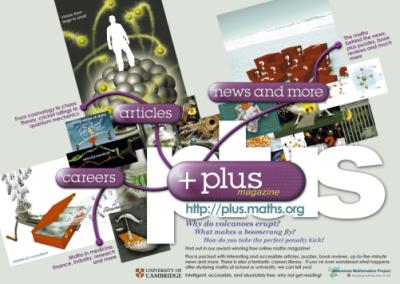This issue's Pluschat topics
- What is maths for? - What do we hope people will know after studying maths at school?
- New Plus posters! - Find out how you can get hold of your own copy of our brilliant new poster!
- Specially for students - This issue of Plus brings you the first of an occasional series expecially for use in the classroom.
What is maths for?
Why do we study maths in school? There has to be a better answer than "because it's compulsory" - but even professional mathematicians don't agree on what that answer is.
One school of thought is that we should study maths because employers want it. Mathematical skills in the workplace, a thoughtful and in-depth study produced in 2002 by the Science, Technology and Mathematics Council, goes into meticulous detail about the mathematical skills and knowledge employers want their employees to possess. It finds that there is a pressing need for what the authors call mathematical literacy - "the application of a range of mathematical concepts integrated with a detailed understanding of the particular workplace context". Perhaps unsurprisingly, traditional topics like coordinate geometry and differentiation don't come high on many employers' wishlists - they are more interested in data-handling.
The second school of thought sees school mathematics primarily as an essential prerequisite to university courses in maths, science, engineering and technology. These courses are comparatively difficult to recruit into, and universities have been complaining for quite some time about falling mathematics standards in their student intake. Key to these courses is what we might term mathematical fluency - the ability to manipulate equations and solve multi-step mathematical problems, a sound understanding of mathematical proof and a range of techniques in areas such as coordinate geometry, and so on.

Literacy or fluency?
In 1995, the London Mathematical Society, together with the Institute of Mathematics and its Applications and the Royal Statistical Society, produced a report called Tackling the mathematics problem. Among the possible causes for the decline in mathematical fluency, they cite too much time spent on data-handling in mathematics lessons:
In recent years English school mathematics has seen a marked shift of emphasis, introducing a number of time-consuming activities (investigations, problems-solving, data surveys, etc.) at the expense of 'core' technique. In practice, many of these activities are poorly focused; moreover, inappropriate insistence on working within a context uses precious time and can often obscure the underlying mathematics.
So we have two constituencies - employers and universities, and two priorities - mathematical "literacy" and "fluency". But surely neither should suffer at the expense of the other. Like history or chemistry, mathematics is an academic subject, and fluency with its core techniques is essential if you want to pursue a career in any of a wide range of numerate disciplines. But - arguably unlike any other academic subject except English - it also teaches a set of basic skills needed by pretty much everyone.
Illiteracy is recognised as an immense social problem; perhaps mathematical illiteracy should be too. But it would be disastrous if ensuring general mathematical literacy came at the expense of the mathematical fluency of those who may go on to careers in mathematics.
New Plus posters!

The Plus team have been busy recently, producing a new poster, and we think our graphic designer, Charles Trevelyan, has done a great job.
We shall be sending copies out in the New Year to as many UK schools as possible, but if you want extra, or can't wait, or just want to be sure of your own, then write to us at
Plus Poster requestenclosing
Millennium Mathematics Project
Centre for Mathematical Sciences
Wilberforce Road
Cambridge CB3 0WA
- an A4 stamped self-addressed envelope (standard first class postage)
- a cheque (drawn on a UK bank) for £2.50, made out to "The Millennium Mathematics Project"
Or, if you have a broadband connection and an A3 colour printer, you can download a very large PDF version of the poster, so you can print out as many copies as you like yourself!
Click here for a copy of the poster - warning, this is a 3M file!
Note on copyright and permissions
We are happy for you to print out copies of the Plus poster for your own use, at home or in a classroom, or at events such as maths fairs or university Open Days, but we retain copyright on the poster, and you may not modify it in any way.
Specially for students

Differentiation: the mathematical magnifying glass Image freeimages.co.uk
This issue, we start an occasional series of articles specifically written to help students of maths. Making the grade, by Chris Sangwin, examines the fundamental ideas behind differentiation, and would be a great introduction to the topic in the classroom. There are plenty of diagrams to explain the ideas, and Chris rounds up with some exercises and problems so you can test your understanding.
If you have anything to say about these or any other topics that might be of interest to Plus readers, e-mail plus@maths.cam.ac.uk. Let us know if you are happy for your email and our response to be published in Plus. (We may edit emails before publication.)